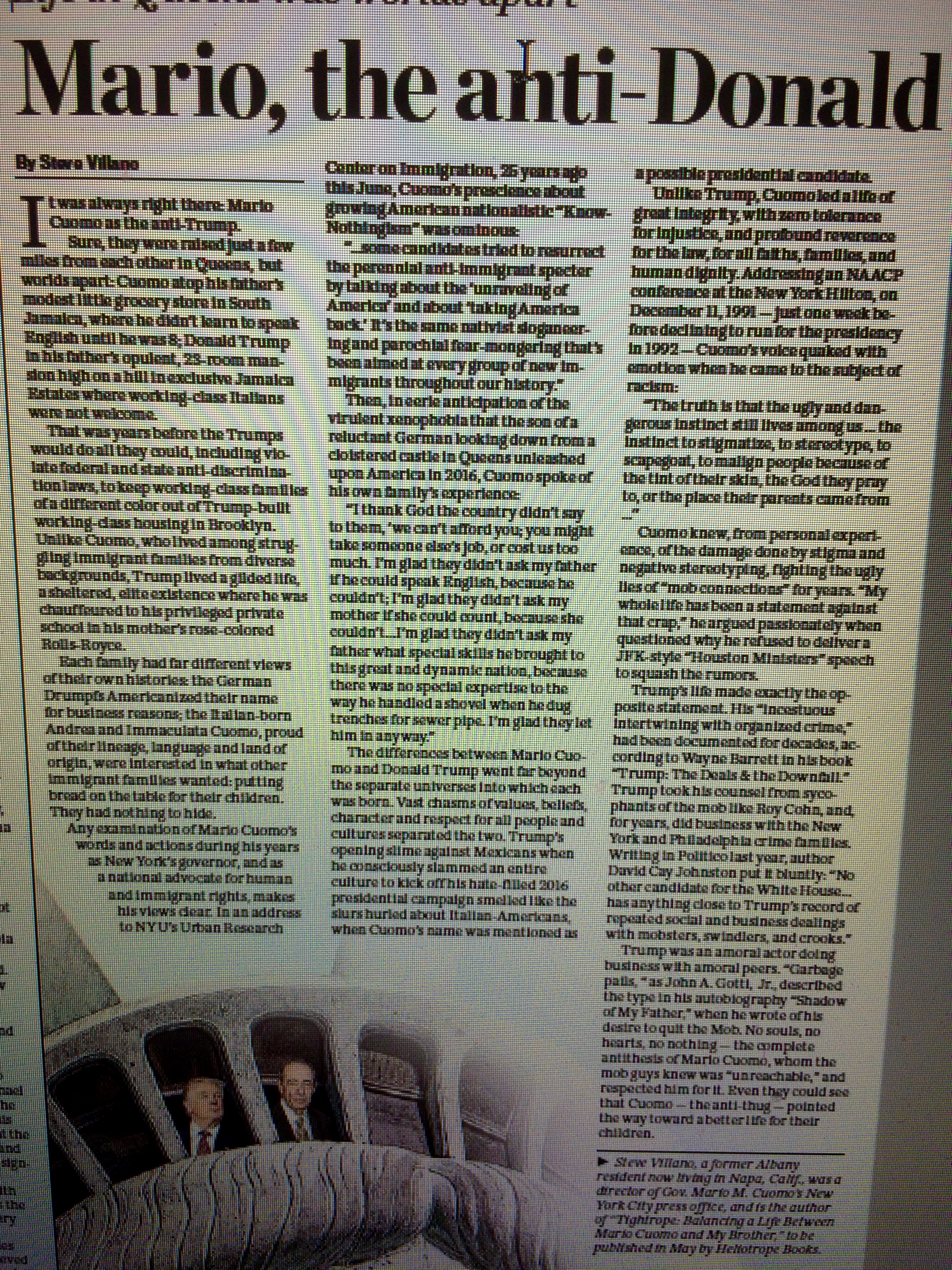
(Mario Cuomo, standing high above Donald Trump in term of human values, dignity, respect for the law, and holding the lamp of freedom high for Immigrants and Refugees the world over. The Albany Times Union of Sunday, January 29, 2017, published my commentary on Mario Cuomo: The Anti-Trump, accompanied by a terrific graphic, pictured above. To more easily read the full commentary, I’ve included full text and a link to the digital piece below:
It was always right there: Mario Cuomo as the anti-Trump.
Sure, they were raised just a few miles from each other in Queens, but worlds apart: Cuomo atop his father’s modest little grocery store in South Jamaica, where he didn’t learn to speak English until he was 8; Donald Trump in his father’s opulent, 23-room mansion high on a hill in exclusive Jamaica Estates where working-class Italians were not welcome.
That was years before the Trumps would do all they could, including violate federal and state anti-discrimination laws, to keep working-class families of a different color out of Trump-built working-class housing in Brooklyn. Unlike Cuomo, who lived among struggling immigrant families from diverse backgrounds, Trump lived a gilded life, a sheltered, elite existence where he was chauffeured to his privileged private school in his mother’s rose-colored Rolls-Royce.
Each family had far different views of their own histories: the German Drumpfs Americanized their name for business reasons; the Italian-born Andrea and Immaculata Cuomo, proud of their lineage, language and land of origin, were interested in what other immigrant families wanted: putting bread on the table for their children. They had nothing to hide.
Any examination of Mario Cuomo’s words and actions during his years as New York’s governor, and as a national advocate for human and immigrant rights, makes his views clear. In an address to NYU’s Urban Research Center on Immigration, 25 years ago this June, Cuomo’s prescience about growing American nationalistic “Know-Nothingism” was ominous:
“…some candidates tried to resurrect the perennial anti-immigrant specter by talking about the ‘unraveling of America’ and about ‘taking America back.’ It’s the same nativist sloganeering and parochial fear-mongering that’s been aimed at every group of new immigrants throughout our history.”
Then, in eerie anticipation of the virulent xenophobia that the son of a reluctant German looking down from a cloistered castle in Queens unleashed upon America in 2016, Cuomo spoke of his own family’s experience:
“I thank God the country didn’t say to them, ‘we can’t afford you; you might take someone else’s job, or cost us too much. I’m glad they didn’t ask my father if he could speak English, because he couldn’t; I’m glad they didn’t ask my mother if she could count, because she couldn’t…I’m glad they didn’t ask my father what special skills he brought to this great and dynamic nation, because there was no special expertise to the way he handled a shovel when he dug trenches for sewer pipe. I’m glad they let him in anyway.”
The differences between Mario Cuomo and Donald Trump went far beyond the separate universes into which each was born. Vast chasms of values, beliefs, character and respect for all people and cultures separated the two. Trump’s opening slime against Mexicans when he consciously slammed an entire culture to kick off his hate-filled 2016 presidential campaign smelled like the slurs hurled about Italian-Americans, when Cuomo’s name was mentioned as a possible presidential candidate.
Unlike Trump, Cuomo led a life of great integrity, with zero tolerance for injustice, and profound reverence for the law, for all faiths, families, and human dignity. Addressing an NAACP conference at the New York Hilton, on December 11, 1991 — just one week before declining to run for the presidency in 1992 — Cuomo’s voice quaked with emotion when he came to the subject of racism:
“The truth is that the ugly and dangerous instinct still lives among us … the instinct to stigmatize, to stereotype, to scapegoat, to malign people because of the tint of their skin, the God they pray to, or the place their parents came from …”
Cuomo knew, from personal experience, of the damage done by stigma and negative stereotyping, fighting the ugly lies of “mob connections” for years. “My whole life has been a statement against that crap,” he argued passionately when questioned why he refused to deliver a JFK-style “Houston Ministers” speech to squash the rumors.
Trump’s life made exactly the opposite statement. His “incestuous intertwining with organized crime,” had been documented for decades, according to Wayne Barrett in his book “Trump: The Deals & the Downfall.” Trump took his counsel from sycophants of the mob like Roy Cohn, and, for years, did business with the New York and Philadelphia crime families. Writing in Politico last year, author David Cay Johnston put it bluntly: “No other candidate for the White House… has anything close to Trump’s record of repeated social and business dealings with mobsters, swindlers, and crooks.”
Trump was an amoral actor doing business with amoral peers. “Garbage pails, ” as John A. Gotti, Jr., described the type in his autobiography “Shadow of My Father,” when he wrote of his desire to quit the Mob. No souls, no hearts, no nothing — the complete antithesis of Mario Cuomo, whom the mob guys knew was “unreachable,” and respected him for it. Even they could see that Cuomo — the anti-thug — pointed the way toward a better life for their children.
Steve Villano, a former Albany resident now living in Napa, Calif., was a director of Gov. Mario M. Cuomo’s New York City press office, and is the author of “Tightrope: Balancing a Life Between Mario Cuomo and My Brother,” to be published in May by Heliotrope Books.
http://www.timesunion.com/tuplus-opinion/article/Mario-the-anti-Donald-10891540.php?cmpid=twitter-desktop

